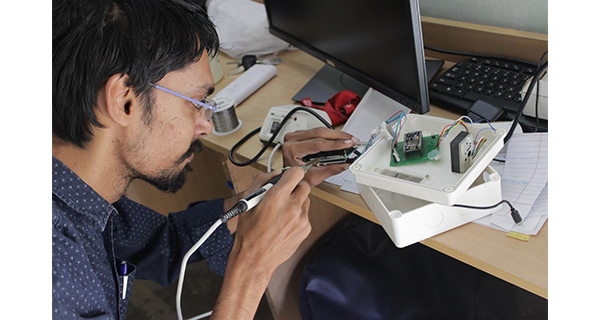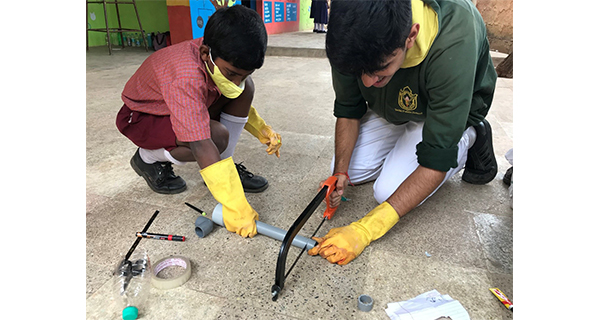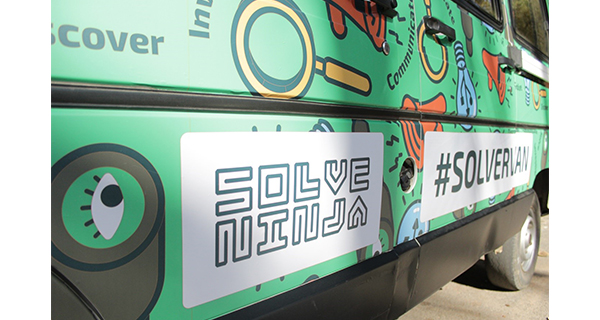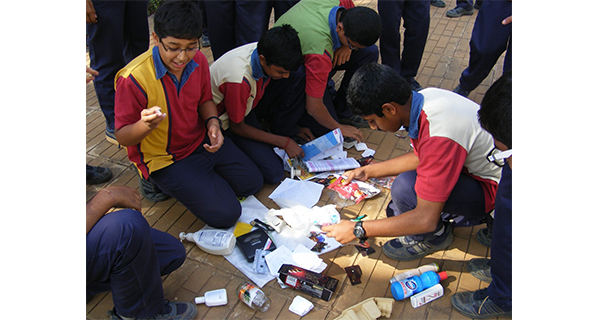Civic issues such as pollution and poor sanitation bother us all. Complaining about these has become a part of our daily lives. Knowledge Tribe met with Kuldeep Dantewadia, who believes in 'solving issues, rather than just talking about them'. Co-founder and CEO of Reap Benefit, Kuldeep’s motto is to churn out solutions for environmental sustainability, that are both low-cost and low-maintenance, by creating ‘Solve Ninjas’. Read all about his journey from a lost college student, to finding his calling and collaborating with Reap Benefit’s co-founder and current CTO, Gautam Prakash.
Knowledge Tribe: Take us through Reap Benefit’s journey.
Kuldeep Dantewadia: Reap Benefit was started in 2012. Before that, it was just Gautam Prakash and me. I had just graduated from college in 2009 and hadn’t participated in placements as I felt that most jobs out there were not serving any purpose. My logic was that what we study should enable us in solving problems around us, but that was not happening. So, I asked myself why I am thinking this way. I realised that it was because of my school and my amazing teachers who used to organise community initiatives and sustainability programmes. Sustainability was not just a project for me. It was a way of life. So, after all this, college life was disillusioning.

Luckily, I used to quiz. One evening, just after the Crucible slot, I saw a slot for Tata Jagriti Yatra, which I found very interesting—the idea of 300 young people traveling in a train and seeing the length and breadth of the country. I applied and fortunately got through. The yatra began in December 2009 and ended in January 2010. For me, this journey was an eye-opener. I traveled nearly 9,500 km and realised that I had so much to learn. We city-born folk tend to think we know everything!
So, once I returned from the trip, I thought, “I have to do something to make an impact; to solve problems.” I figured that the easiest problem to solve would be that of garbage disposal. I thought, “How complicated can it be?”. I was so wrong. It’s not that easy. I collected garbage from over 150 households around Bengaluru for nearly seven months. It was a great experience. It made me realise how disconnected we are from our reality. We mechanically throw trash, totally unaware about what is done with it. I also realised how many people are deployed to manage the mess created by one set of people. At this point, I went as a speaker to an event called ‘Ashoka Green Planet’ that was organised by Ashoka: Innovators for the Public. This is when I met Gautam, who was working with Ashoka, in the ‘Youth and Children’ team. I soon found out that he was brought up with the practice that if there is a problem, you need not wait for someone else to solve it for you. Moreover, both of us felt the same way about our city, so I told him about my initiative. In 2011, we collaborated on the idea of getting young people to start solving issues, rather than just talking about them. We wanted to start at the ward level, which is the smallest unit in a city; and the smallest unit in a ward is a young person. To target the youth, we approached schools and colleges. In just a couple of years, we realised that it’s working. In a way, this was like quizzing. Initially, the quizmaster would realise that people are excited about his questions. But, the real responsibility of a quizmaster is not to serve the people who already love quizzing. It is to excite non-quizzers about quizzing, so even if they don’t win the quiz, they enjoy answering the questions. That’s what we wanted to do with Reap Benefit. We wanted to make public responsibility a habit.
Bringing Gautam onboard was the best decision. He came with a lot of hands-on experience—he built nearly all the solutions. He developed an organic enzyme that converts food waste into compost, he co-designed India’s first waterless low-cost urinal for children and he co-created a low-cost censor that monitors air pollution in different areas. So, in the first three years of Reap Benefit, we focussed on intensive mobilisation, working with both, private and government schools. Then, we enabled students to reach out to us on WhatsApp if say, there was an open drainage outside their house, urge the authorities to respond and seek a status update. We can guide you on how to approach issues and on possible solutions. People can also share their ideas on the platform, explore funding options and run local campaigns as well. So how it works is, every neighborhood has five types of ‘Young Ninjas’—‘Reporting Rhinos’ for reporting, ‘Campaign Chameleons’ for spreading awareness, ‘Hands-on-Hippos’ for implementing solutions, ‘Techno Tigers’ for driving it all using technology, and ‘Lions’ who integrate everything at the policy level. There is a role for everyone. We have worked with 24,000 people as of 2018 and are currently working in Bengaluru, Chennai, and Hubballi. Through the data we have collected, our team has spent half a million hours in problem-solving in the community, we have crowd-sourced around 2-3 lakh data points with respect to sanitation, air quality, potholes, etc. Approximately 500 tonnes of waste has been diverted and recycled, and about 44 million liters of water have been saved. We have improved sanitation systems in around 300 government schools and co-created nearly 200 products. Not all of them can be scaled, but the prototypes are there. So yes, that’s been our journey so far.

KT: Tell us about your experience at educational institutions, working with educators and children.
KD: Well, we have been lucky to have worked with schools that understood our work. There have been two schools that have supported us immensely over the years. One is Sri Kumaran Children’s Home Educational Council. The director, Mrs. Deepa Sridhar, is very open-minded. Mrs. Jayanthi Sridhar, the facilitator there, also helped the work progress. The other school is TVS Academy, Hosur. These schools became models for other educational institutions to follow. This is great because often, the struggle is that most schools have forgotten their primary purpose of creating responsible citizens. Their primary purpose is not to create engineers, doctors, scientists, sportspeople or accountants. It’s, in fact, ironic that we have so many engineers and yet, we find it difficult to build a proper drainage system or better flyovers. Now I see citizens becoming increasingly responsible, not because of Reap Benefit, but because when you get out of your niche and see the issues in the world around you, you realize that someone has to solve them.
KT: We’re sure you would have faced quite a bit of resistance to your initiatives as well. How do you work around them and convince people to co-operate with your campaigns?
KD: Well, beyond a point it really isn’t in our control. Having said that, we have become more efficient at bargaining with people over the last six years, be it at the school level or the government level. There are hurdles in working with both sectors, but I empathize with authorities in both domains because there are just so many variables in their day-to-day functioning that affect their response to us. For schools, it may be the expectations from parents or examinations. Similarly, governments have other priorities above these civic issues. In understanding this, I have realised one thing—people will respond positively if we have a good point to prove. I genuinely feel that both, schools and the government are portrayed in the wrong light. They mean well but are under-staffed. Hence, they are under-skilled and do not know how to go about these initiatives. But this is just a matter of time. Now, schools and governments across different states are reaching out to us. Moreover, the thing with governments is that they are open if you approach them with a solution. Otherwise, they tend to get defensive. At the end of the day, most of us have no idea how tough it is to work at major decision-making levels in the government. So, my point is that a pilot has to deal with turbulence. She cannot say that she will fly only when there is no turbulence.

KT: We find it very interesting that you also have workshops for educators, in addition to those for children. How has that experience been so far?
KD: Working with teachers is something we only started this year. We never ventured into this earlier because we felt that they are already under so much stress. See, we have to realise that everybody in the not-for-profit space—be it regarding mental health, safety, women empowerment, environment—wants to work with young people. So what do we do? We develop curriculum and content and hand it over to teachers. But the teacher has to build her capacity to deliver that program. The good thing is that, if we work in a school for two to three years, a few teachers naturally get interested and get in touch with us. I think that teachers find it very difficult to solve problems, because they are used to working with a set of textbooks and curriculum. If we do our work well, I see that teachers are more open to us than students. For example, if a class 12 student hears the term ‘Reporting Rhino’, he may make fun of it. On the other hand, a teacher gets very excited. So in the process of training teachers, we also get to support them, so that they can make that paradigm shift. We have to credit that the teaching scene itself is going through an interesting transition. A decade ago, only certain type of people would opt for teaching. Today, we have extremely well-to-do people who are becoming teachers, so it isn’t just a job for them. We also have people who travel 20-25 kilometres to teach. The other perspective is that earlier, schools used to sustain teachers for a minimum of 12-15 years. The field was more service-oriented. But today, teachers and even principals change schools every couple of years. Teaching has become a professional service. Due to this, teachers want to have certain skills mentioned in their CVs. But, they sadly don’t have the last say in the school’s response to us, and that’s fair. The important thing is that we should not pressurise them to co-operate with us because examinations are inevitable. We need to maintain a comfortable relationship with them, otherwise their attitude towards our programs will be, “Oh, here’s one more session. Let’s just get done with it.”

KT: We’d love to hear about the co-developed innovations that you carry out with youngsters.
KD: Well, our idea is to put out as many probable solutions as we can. We are not too fixated if they will completely succeed. If they work, they work; if they don’t, we learn. One of our solutions is that one can approach the local corporator. We have built tools, using which you can get step-by step guidance on how to report issues and follow up. We also have the option of sending them the corporator’s email ID. All this data is out there. Beyond this, there are our physical products. In 2013, no one wanted to carry out composting because of the smell. That’s when Gautam and I identified cocopeat as a base for the same. Today, it is a full-fledged composting accelerator called ‘De’Grade’ and is available in Bengaluru, Goa, Mumbai, Delhi and Mangaluru. Recently, we built India’s first low-cost ‘Do-it-yourself air pollution monitoring system’. Using this, you can monitor the air quality in your area real-time and that data goes to the cloud from where any citizen can access it. Our idea is that seven to eight years from now, when people choose the area they are going to live in, data regarding air quality should be available to them. Another idea that we co-developed with students involves censors to carry out ‘behavioural nudges’. If you are using more water than required, it beeps. We performed this experiment at Carmel School, Bengaluru and saved around 2 million litres of water this year. A few years ago, we had also developed low-cost waterless urinals using discarded water cans. Today, it has evolved into a proper product. We know people in Manipal and Suratkal, who are developing a censor, to check the dehydration level of primary school children when they urinate. We are working on an application that detects potholes real-time. These are just some of the solutions that we have managed to churn out.
KT: How do you ensure that you stand out among your contemporaries?
KD: Honestly, there are so many problems around us. So, there may be thousands of Reap Benefits in the country. But we have never operated in order to stand out. For example, a lot of schools and colleges have suggested that we integrate our work into their curricula, but we are very clear that we will not do that. We believe that doing so removes the novelty factor from our work. We want our work to be used as a problem-solving tool and not merely a learning tool. If you grow your organisation, you become equipped to handle more. But if are small and the best in your space, then you are limiting yourself. If I have to answer your question, we are a very adaptable organisation that can build solutions and a technology platform; we can work on-ground; we can work with the government, and with students as well. These things may make us stand out. But standing out isn’t our focus because that doesn’t guarantee solving any problems.
KT: What according to you, have been the absolute highlights in your journey so far as Reap Benefit?
KD: Well, there have been memorable moments at the internal and external level. Reap Benefit was recently mentioned by Barack Obama, so that gave us a lot of visibility. Paul Polman, the former CEO of Unilever, recognised our work. The Ashoka Fellowship was associated with us in 2013, which lent a lot of support and recognition to us. Gautam (Prakash) cleared the MIT Bits and Atoms Fab Lab and was one of the few non-engineers in the world to do so. Another teammate, Archana, got selected for a very prestigious programme by change.org. These are highlights—when not just the founding members, but team members also have their own identity. Apart from this, the other major highlight has been that students who I have personally worked with, get in touch with me four or five years later, saying that the want to make a career out of working towards environmental sustainability. This synergises with our concept of the Youth Board, where its members are accountable to the leadership of the organisation. We have and have had a lot of interesting people here. One of them recently wrote a research paper and presented it at the National Law School of India University. There are students learning behavioural science to improve civic issues.
The internal highlights are things like, when we were hiring this Sunday, we had two students who we had worked with earlier, helping us. They essentially selected people who can work with Reap Benefit. For me, that is a highlight; that is a testimonial. It’s these smaller things that go unreported in the media, that are more important to me. In my opinion, if you do these small things right, the other things will fall in place.

KT: What’s next for Reap Benefit?
KD: My next plan is to build a very strong culture and team. Sometimes, what happens is that we start an organisation and are so busy running it, that the other aspects internal to the company tend to go on the back-burner. Other than this, we are planning to start a YouTube channel to help the public in problem solving. Then of course, there is the ‘Solve Ninja’ application. The idea is to get one million young people to build a community using the application in the next three years, to solve problems.
KT: That’s brilliant, Kuldeep. Our final two questions for you— how would you define knowledge, and what message would you like to leave our readers with?
KD: Thank you. Well, to answer your first question, knowledge to me is doing and experiencing. It can only be gained by performing, and not by merely acquiring information. The message that I would like to leave for your readers—and I know that many of them are youngsters, is that—forget what others are doing or not doing. If you really want to do something, you have to start it. The power of solving issues is in our hands. Most of us are even afraid of trying and conclude that our solutions will not work. We have worked with students who have gone through phases of feeling this way. But the thing is that, once they start proactively solving problems, there is no looking back. The concept is that, we are part of a society, and if we cannot take care of it, there is no point. The government is just a reflection of who we are. If you want to see a better reflection, you have to be better. It is as simple as that. This just becomes simpler with the ‘Solve Ninja’ application. Everyone can start using it and take the power in their hands. You don’t have to wait for Reap Benefit to come and tell you that this is how you have to solve the problem.

